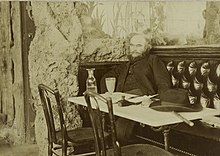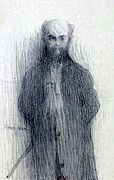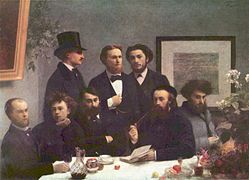Paul Verlaine
Paul Marie Verlaine (Metz, March 30, 1844-Paris, January 8, 1896), known as Paul Verlaine, was a French poet, belonging to the symbolist movement. In the lyrical part there is a diversity of trends that shows a literary world where everything is mediated by metaphor and allegory.
Biography
From a family belonging to the petty bourgeoisie, his father, like Arthur Rimbaud's, was an army captain. He did his studies in Paris, and came to work in the town hall. He frequented Parisian cafés and literary salons, and in 1866 he collaborated in the first Contemporary Parnassus publishing the Saturnian Poems , influenced by Baudelaire, although they already announced the «effort towards Expression, towards returned Sensation» (letter to Mallarmé dated November 22, 1866), a purpose that he would develop in his best works. In 1869, Watteau's Gallant Parties, fantasies evocative of the 18th century, confirmed this orientation. In 1870, he married Mathilde Mauté, for whom he wrote The Good Song.
The following month, the young couple began to live with Mathilde's parents, it was then that Arthur Rimbaud appeared in her life and completely changed it. Rimbaud moves in with them at the invitation of Verlaine, who had discovered the adolescent's precocious genius. Soon after, the two become lovers and, after Rimbaud's behavior shocked Parisian literary circles, Verlaine leaves his wife and goes with the young poet to London. During this trip, he writes a large part of the Romanzas sin palabras collection.
Arthur Rimbaud
In July 1873, he traveled with Rimbaud to Brussels (Belgium). On July 10, 1873, Verlaine shot his young lover twice, who was wounded in the wrist. The poet was sentenced by judge Théodore t'Serstevens to two years in prison, which he served, first in Brussels and, later in the new Mons prison. During his stay in prison (October 1873 to January 1875) Verlaine drew up the basis for a book that would never see the light of day (In Prison). His wife obtains the separation, after a process initiated in 1871. In prison he converted to Catholicism, in the early morning, he wrote, of a "mystical night" . The abandonment of Carcelariamente and the idea of compiling Sabiduría, which will form part, with Antaño y hogaño (1884) and < i>Parallel (1888), from a large anthology.
When he was released from prison, he returned to England and then to Rethel, where he worked as a teacher. In 1883, he published in the magazine Lutèce the first series of the “cursed poets” (Stéphane Mallarmé, Tristan Corbière, Arthur Rimbaud), which helped to make him known. Along with Mallarmé, he is treated as a teacher and precursor by the symbolist and decadentist poets. In 1884, he published Yesterday and Now , which marks his return to the literary avant-garde, although the book was composed mainly of poems from before 1874.
From 1887, as his fame grew, he fell into the blackest of miseries. His literary productions of those years are purely food. At this time he spends his time between the cafe and the hospital. In his last years he was elected "Prince of Poets" (in 1894) and was awarded a pension. Prematurely aged, he died in 1896 in Paris, at the age of 51 from an overdose of hallucinogenic substances. The day after his burial, several passersby recounted a curious fact: the statue of Poetry, located in the Opera Square, lost an arm, which broke along with the lyre it was holding, at the moment the hearse de Verlaine passed by:
Influence
Verlaine's influence was great among his contemporaries and only grew after his death, both in France and in the rest of the world. In Spanish, modernism cannot be understood without the figure of Verlaine. The work of some great Hispanic poets, such as Rubén Darío, Manuel Machado, José Martí or Pablo Neruda are a direct or indirect consequence of that of the French poet.
Anecdote
The first two stanzas of the poem "Chanson d'automne" ("Autumn Song") were the password chosen by the Allies in World War II to give the signal to the French resistance that the landing was beginning from Normandy:
Les sanglots longsDes violons
Monotone.
De l’automne
Blessent mon cœur
D’une langueur
Works
The most select:
Poems
- Poems saturnianos (1866)
- Friends (1867)
- Welsh parties (1869)
- The Good Song (1870)
- Wordless Romance (1874)
- Cellularly (Poemary written in prison [1873-1874], first published in 1992 and translated into Spanish by Pedro José Vizoso in 2020)
- Wisdom (1880; 2nd ed. 1891)
- Year and day (1884)
- Love (1888)
- Parallel (1889)
- Dedicatory (1890)
- Women (1890)
- Men (title in Spanish in the original, 1891)
- Songs for her (1891)
- Intimate liturgy (1892)
- Elegías (1893)
- Odas in your honor (1893)
- In limbos (1894)
- Epigrams (1894)
- Carne (posthumous, 1896)
- Invective (posthumous, 1896)
- Biblio-sonetos (posthumous, 1913)
- Forgotten works (postum, in three volumes 1926-1929)
Prose
- Fucking poets (1884)
- Louise Leclercq (1886)
- Memories of a widower (1886)
- My hospitals (1891)
- My prisons (1893)
- Fifteen days in the Netherlands (1893)
- The men of today (Twenty-two biographies of poets and literate, 1885-1893)
- Confessions (1895)
Gallery
Contenido relacionado
Bellerophon
The beast in the cave
Ada











